
The field of public health, now more than ever, holds significant importance. The recent COVID-19 global pandemic demonstrated the necessity for health care and disease prevention, skyrocketing the demand for public health professionals. If you’re considering going into this field, you may be considering what Master of Public Health jobs are available. Whether you’re already pursuing a Master of Public Health degree or simply contemplating it, we’ve got you covered!
This guide will share the career paths your MPH degree can help you achieve. From engaging roles at government agencies and nonprofit organizations to positions that let you conduct cutting-edge research and influence critical policy decisions, the spectrum of Master of Public Health jobs is broad and varied. So, let’s explore the kind of jobs you can get with a Master of Public Health!
Career Opportunities in Public Health
A Master of Public Health degree can prepare you for a wide range of career opportunities. Here are some of the most popular job positions available to MPH graduates.
Public Health Analyst
 A public health analyst is a crucial member of the public health workforce. Their role is rooted in the analysis and interpretation of data relating to the health of entire communities, with a specific focus on public health policies and programs. They dig into the details of public health policies and programs, figure out what’s working and what’s not, and find solutions to improve everyone’s health.
A public health analyst is a crucial member of the public health workforce. Their role is rooted in the analysis and interpretation of data relating to the health of entire communities, with a specific focus on public health policies and programs. They dig into the details of public health policies and programs, figure out what’s working and what’s not, and find solutions to improve everyone’s health.
A big part of their job is teaching people about important health issues and running health programs. They hold seminars, give talks, and work to get everyone up to speed on the latest in public health. They use these to create, run, and improve programs for public health.
Epidemiologist
Epidemiologists study diseases, how they spread, and how to prevent more people from getting sick.
Their work involves a lot of research, looking at medical data, and running tests to figure out the causes and patterns of diseases. They’re experts in finding out the “who,” “what,” “when,” “where,” and “why” of different health conditions and outbreaks.
They also spend time educating the public and health officials about diseases and how to prevent them. If there’s a disease outbreak, they’re usually on the front lines, working to understand what’s happening and how to control it.
Their findings can lead to changes in public health policy, like new guidelines for handling a disease outbreak or suggestions for better health practices.
Health Educator
A health education specialist helps people understand how to live healthier lives. Their job is all about giving people the knowledge and tools they need to take care of their health.
They plan, create, and deliver educational programs that cover a wide range of health topics. This could be anything from teaching kids about the importance of good nutrition to explaining how to prevent the spread of diseases.
A big part of their job is making complex health information easy to understand. They might use things like brochures, videos, or interactive workshops to get their message across.
They also work with community leaders, doctors, schools, and other organizations to spread health information and promote healthier behaviors.
Community Health Worker
A community health worker is a go-to health guide within their community. They act as a bridge between healthcare services and community members, ensuring that health information, resources, and care are accessible to everyone.
They assist people in understanding their health conditions, making sense of doctors’ instructions, setting up medical appointments, and finding resources for healthier living. They may also conduct home visits or community meetings to provide health education. Their main goal is to ensure that everyone in their community has the resources and knowledge to manage their health effectively.
Environmental Health Specialist
 An environmental health specialist explores potential health hazards in our environment. They examine factors like air and water quality, waste disposal, and food safety to understand how they might affect people’s health.
An environmental health specialist explores potential health hazards in our environment. They examine factors like air and water quality, waste disposal, and food safety to understand how they might affect people’s health.
They’re responsible for conducting inspections, collecting and analyzing environmental data, and helping create strategies to improve public health. They also help enforce laws related to environmental health and safety. Their work is crucial to ensure that our surroundings — from the air we breathe to the food we eat — are safe and healthy.
Biostatistician
A biostatistician uses their skills in math and statistics to draw meaningful insights from complex health data. This can involve designing studies, collecting data, analyzing results, and interpreting findings to understand health trends and outcomes.
Their work is vital in many areas, like researching new treatments, monitoring disease outbreaks, evaluating healthcare programs, and guiding public health policies. By turning data into knowledge, they help shape strategies and decisions that can improve health on a large scale.
Health Services Administrator
A health services administrator oversees the day-to-day operations of a healthcare facility like a hospital, clinic, or nursing home. Their role can include managing budgets, coordinating services, planning schedules, ensuring regulatory compliance, and improving the quality of care.
They’re the ones who make sure that everything in the facility runs smoothly so that doctors, nurses, and other healthcare staff can focus on patient care. They play a key role in making healthcare services efficient, effective, and patient-friendly.
Global Health Specialist
A global health specialist is a global health ambassador. They work to improve health and achieve equity in health for all people worldwide. They might tackle global issues like pandemics, climate change, and health disparities. Their role involves research, policy-making, program management, and advocacy.
They collaborate with various international organizations, governments, and communities to develop and implement strategies that can combat global health challenges. Their work contributes to a healthier and safer world for everyone.
Key Sectors for Public Health Jobs
Master of Public Health graduates are equipped with a unique skill set that can be applied across various sectors. Here are some prominent places where MPH graduates can find rewarding careers:
Jobs in Nonprofit Organizations for MPH Graduates
 Nonprofit organizations present excellent opportunities for those with an MPH degree. These organizations often focus on enhancing public health via education, advocacy, and service delivery, aligning with many MPH graduates’ career goals.
Nonprofit organizations present excellent opportunities for those with an MPH degree. These organizations often focus on enhancing public health via education, advocacy, and service delivery, aligning with many MPH graduates’ career goals.
Well-known nonprofits like the American Public Health Association, World Health Organization, and Centers for Disease Control and Prevention provide myriad job roles. These could range from research and policy development to program management and advocacy, to making nonprofits a dynamic space for public health work.
Government Jobs Suitable for MPH Graduates
Government organizations offer a broad spectrum of public health job opportunities. These agencies, at local, state, and federal levels, are crucial in developing and implementing public health policies and programs.
Popular agencies like the CDC, National Institutes of Health (NIH), and the Department of Health and Human Services (HHS) are common places where MPH graduates seek employment. Here, roles can span research, policy-making, program management, and advocacy. Plus, government jobs often come with competitive salaries and benefits, and ample opportunities for advancement.
Private Sector Jobs for MPH Degree Holders
Jobs in the private sector are another great area where graduates with a Master of Public Health (MPH) can find work. This includes private health clinics, pharmaceutical companies, and consulting firms which often need the knowledge and skills of public health experts.
Private sector jobs usually pay well and provide more chances to move up compare to jobs in nonprofit organizations or government roles. Plus, these jobs can give you the chance to work on exciting new public health projects. They can also provide opportunities to work on cutting-edge public health initiatives. For example, when a drug company is working on a new medicine or vaccine, they often need public health experts to help with clinical trials and to make sure they’re following all the rules and regulations.
Seizing Your Future in Public Health
The diverse world of Master of Public Health jobs is ripe with opportunities, offering countless avenues to make a meaningful impact on the health of communities worldwide. Whether your interest lies in research, policy development, advocacy, or education, an MPH degree opens the door to a multitude of career paths in nonprofit organizations, government agencies, and the private sector.
Jobs in these sectors are not only rewarding but also offer opportunities for growth, advancement, and competitive remuneration. From working on the front lines of public health crises to conducting cutting-edge research and influencing policy decisions, the scope is vast and the possibilities are limitless.
With the rapidly increasing demand for public health professionals, now is an excellent time to seize the opportunity and shape your future in the public health field. With an MPH degree under your belt, you have the power to shape a healthier world. Remember, the journey of public health is not only about what you stand to gain but also the difference you can make in people’s lives and communities.
So, as you either start considering your Master of Public Health or begin navigating the vast career opportunities post-graduation, we wish you all the best. Here’s to your success in finding the role that not only fits your aspirations but also enables you to contribute significantly to public health. Your journey is just beginning, and it promises to be a fulfilling one. Good luck!
Hear from MPH students, faculty, and alumni.
Program Contacts
General Program Information
For more information about the program, and questions about admissions, contact:
434.544.8770
mph@lynchburg.edu
Program Director
June Sullivan ’21 DMSc, PA-C
Adjunct Faculty in the Doctor of Medical Science Program
Director of the Master of Public Health Program


